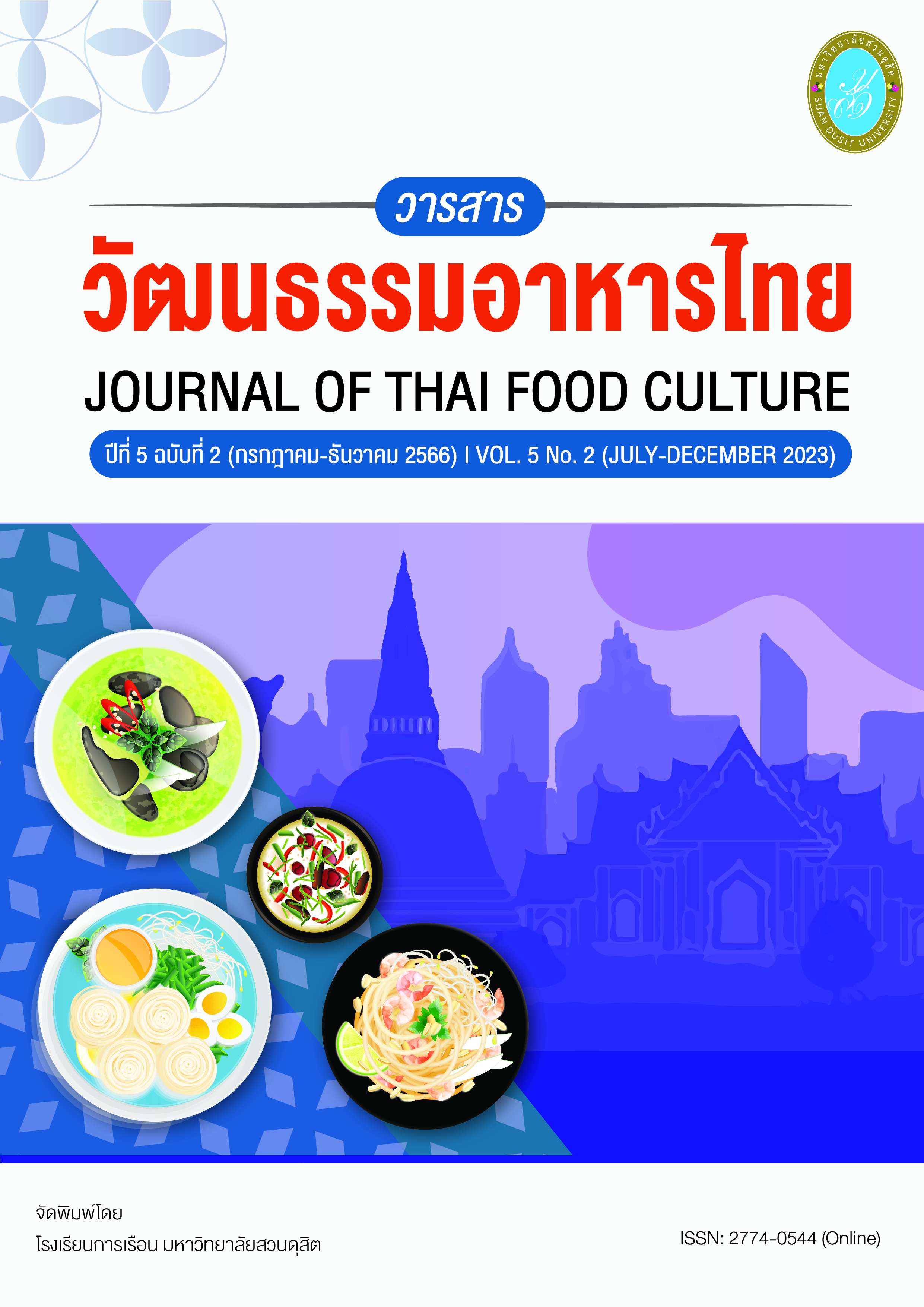Bai Sri: Auspicious rice for the Southern-Isan community in Thailand
Abstract
This article aims to study an origin of Bai Sri, beliefs, and traditions in using patterns, characteristics and details of Bai Sri of the Southern-Isan community, as well as the current situation of using Bai Sri in the ritual traditions of the southern Isan community, it was found that Bai Sri had originally came from Khmer. It is considered to be Khao Khwan used in rituals to call on people to make offerings. Making merit is popular at every important stage of life. Currently, many styles and shapes have been developed. Beliefs and traditions in using Bai Sri of the southern Isan community have been passed down for thousands of years. Traditional culture and important beliefs included Sacrifice, cleansing, exorcism Fortune-telling in activities related to people, animals, things and places is divided into Bai Sri Pak Cham, Bai Sri Tat, Bai Sri Ton, and Bai Sri Lak. It is popular to use the ancient Bai Sri and the new Bai Sri together in various ceremonies, but the trend of using traditional Bai Sri is gradually decreasing. Creating awareness in the community or allowing everyone to participate in pointing out its importance is what will ensure that the traditional Bai Sri craft will continue in the future.
References
Chulalongkorn, His Majesty King. (1911). Royal Ceremony 12 Month. Bangkok : Silpa Bannakan.
Fine Arts Department. (1980). Chuen Kwan Meeting. Bangkok, Office of Literature and History : Author.
Fine Arts Department. (2021). Rice, Ton Than Thai Civilization. Bangkok, Office of Literature and History : Author.
Klangrit, T., Siripaprapagon, Y., & Suriya Klangrit. (2021). A Study of the Equipment for Ritual of the Thai-Khmer People. Mahamakut Buddhist University NakhonPathom, Faculty of Buddhism and Philosophy, National Symposium (3rd). Buddhism and Philosophy: Concepts, Perspectives, Society, Post-Covit 19. NakhonPathom : Author.
Laomanacharoen, S. (2022). Ghost Religion - Under the Precipitous Khao Phra Sumeru. Bangkok : Natahak.
Ninwonnapa, R., & Prasertsung, P. (2016). Literlature of Isan Jataka : Identity reflection of Belief, Way of Life, Tradition and Rite. Journal of Research for Development Social and Community, 3 (1), 85-97.
Phra Somchai Sangwaro (Sukwinai), Phra Natthawee Tanawaro (Sattayabut). & Thanarat Sa-ard-iam. (2021). Haupleung : Value and Significance in Way of Life of the Surin Khmerian Buddhists. Journal of Institute of Trainer Monk Development, 4 (2), 74-86.
Plainoi, S. (2010). Encyclopedia of Thai Culture. Bangkok : Pimkham.
Sangketkit, W. (2023). teacher, Ban Taluak School. Interview.
Sangketkit, W. (2016). Ancient Ceremony Southern Isan - Cultural World Heritage. Surin : Surindra Rajabhat University.
Sathiankoset, Y. (1963). Kwan and The Tradition of Making Kwan. Bangkok : Kao-Nah.
Siripaprapagon, Y., Kanthiang, K., Phra Kru Sathukidkoson, Klangrit, S., & Kaewhorm, C., (2021). Mamuat : Ritual Communication with the Sacred Spirit of Thai Khmer People in Thailand. Journal of Development Studies, 4 (1), 74-97.
Siripaprapagon, Y. (2017). Bai Sai : Buddhist Innovation as a Sacrifice to Promote Constancy Way of Life of Thai-Khmer Group in Surin Province. Journal of Buddhist Studies Vanam Dongrak, 4 (1), 16-23.
Srithon, A., & Jantaranusorn, K. (2018). A Study of a Conservative form of Wrist-Tying (Bai Si
Su Kwan) Ritual. PHUPHAN SARN Journal of Humanities and Social Sciences, 1 (1), 1-27.
Thongthip, T., Phra Kru Srisunthonsarakit & Phra Maha Sombut Thanavaro. (2017). A study of History and Routes of Religious and Cultural Tourism in the South East Region. Surin : Mahachulalongkornrajavidyalaya University Surin Campus.
Uitekkeng, K., Panich, V., & Laomanacharoen, S. (2021) Ghost-Brahmin-Buddhism in Thai Religion. (3rd ed.). Bangkok : Natahak.
Wongpracha, M. (2013). Pa Kwan Pan Bai Sri. Master’s thesis, Graduate School, Silpakorn University.
Wongthes, S. (2016). Collective Culture Southeast Asia in ASEAN. (2nd ed.). Bangkok : Natahak.
Wongthes, S. (2017). Kwan Aey Kwan - Where did come from?. (2nd ed.). Bangkok : Natahak.
Wongthes, S. (2020, July 5). Bai Sri Khao Suk Khao Kwan Offering sacrifices to the elves, the blue spirits. Matichonweekly. Retrieved April 30, 2023, from https://www.matichonweekly.com/column/article_321274
Wiwatkunakorn, W. (2021). Spiritism in Thai State. Thai Research and Management Journal, 2 (2), 70-76.
Downloads
Published
How to Cite
Issue
Section
License
Copyright (c) 2024 Suan Dusit School of Culinary Arts

This work is licensed under a Creative Commons Attribution-NonCommercial-NoDerivatives 4.0 International License.
ลิขสิทธิ์ต้นฉบับที่ได้รับการตีพิมพ์ในวารสารวัฒนธรรมอาหารไทย ถือเป็นกรรมสิทธิ์ของโรงเรียนการเรือน มหาวิทยาลัยสวนดุสิต ห้ามผู้ใดนำข้อความทั้งหมดหรือบางส่วนไปพิมพ์ซ้ำ เว้นแต่จะได้รับอนุญาตอย่างเป็นลายลักษณ์อักษรจากโรงเรียนการเรือน มหาวิทยาลัยสวนดุสิต นอกจากนี้ เนื้อหาที่ปรากฎในบทความเป็นความรับผิดชอบของผู้เขียน ทั้งนี้ไม่รวมความผิดพลาดอันเกิดจากเทคนิคการพิมพ์


